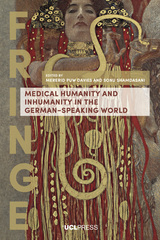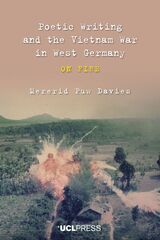3 books by Davies, Mererid Puw

Medical Humanity and Inhumanity in the German-Speaking World
Edited by Mererid Puw Davies and Sonu Shamdasani
University College London, 2020
Medical Humanity and Inhumanity in the German-Speaking World is the first volume dedicated to exploring the interface of medicine, the human and the humane in the German-speaking lands. The volume tracks the designation and making through medicine of the human and inhuman, and the humane and inhumane, from the Middle Ages to the present day. Eight individual chapters undertake explorations into ways in which theories and practices of medicine in the German-speaking world have come to define the human and highlight how such theories and practices have consolidated, or undermined, notions of humane behavior. Cultural analysis is central to this investigation, foregrounding the reflection, refraction and indeed creation of these theories and practices in literature, life-writing, and other discourses and media. Contributors bring to bear perspectives from literary studies, film studies, critical theory, cultural studies, history, and the history of medicine and psychiatry. Thus, this collection is historical in the most expansive sense, for it debates not only what historical accounts bring to our understanding of this topic. It encompasses, too, investigation of life-writing, theory and literary and documentary works and so brings to light elusive, paradoxical, underexplored – yet vital – issues in history and culture.
[more]

Poetic Writing and the Vietnam War in West Germany
On fire
Mererid Puw Davies
University College London, 2023
An examination of the largely forgotten anti-war writing from West Germany spurred by the Vietnam War.
Though the Vietnam War did not directly involve West Germany, it was nonetheless a decisive catalyst for the era’s wider protest movements in that country, and it gave rise to an ardent anti-war discourse. Poetry and poetic writing were key to anti-war work. Hundreds of poems and related writings about Vietnam circulated in West Germany, yet they are almost entirely forgotten today. Poetic Writing and the Vietnam War in West Germany uncovers and explores some of that rich artistic production in order to present a new history of engaged poetic writing in West Germany in the 1960s and 1970s and to draw out distinctive characteristics of wider protest culture. In doing so, it makes the case for attending to marginal, non-canonical, or neglected literary and cultural forms, and for critical thinking about why they might, over time, have been obscured. The book also offers a case study for reflection on the representation of war, on ways in which German oppositional culture could imagine its others, and on the relationship of poetry to the historical world.
Though the Vietnam War did not directly involve West Germany, it was nonetheless a decisive catalyst for the era’s wider protest movements in that country, and it gave rise to an ardent anti-war discourse. Poetry and poetic writing were key to anti-war work. Hundreds of poems and related writings about Vietnam circulated in West Germany, yet they are almost entirely forgotten today. Poetic Writing and the Vietnam War in West Germany uncovers and explores some of that rich artistic production in order to present a new history of engaged poetic writing in West Germany in the 1960s and 1970s and to draw out distinctive characteristics of wider protest culture. In doing so, it makes the case for attending to marginal, non-canonical, or neglected literary and cultural forms, and for critical thinking about why they might, over time, have been obscured. The book also offers a case study for reflection on the representation of war, on ways in which German oppositional culture could imagine its others, and on the relationship of poetry to the historical world.
[more]

Writing and the West German Protest Movements
The Textual Revolution
Mererid Puw Davies
University of London Press, 2016
The 1960s protest movements marked an astonishing moment for West Germany. They developed a political critique, but are above all distinctive for their overwhelming emphasis on culture and the symbolic. In particular, reading and writing had a uniquely prestigious status for West German protesters, who produced an extraordinary textual culture ranging from graffiti and flyers to agit-prop poetry and autobiographical prose. By turns witty, provocative, reflective and offensive, the avantgarde roots of anti-authoritarianism are as palpable in their texts as their debt to high literature. But due to this culture’s (apparently) anti-literary tone, it has often remained illegible to traditional criticism. This volume presents close readings and analyses of emblematic examples of texts, some forgotten, others better known, embedding them in historical, cultural, theoretical and aesthetic context, and illuminating representative moments and preoccupations in anti-authoritarian culture, from the Vietnam War to the Nazi past, to dirt and hygiene. They outline an anti-authoritarian poetics and uncover some of the texts’ latent content, revealing often hidden tensions and contradictions, above all in relation to the German past and questions of authority.
[more]
READERS
Browse our collection.
PUBLISHERS
See BiblioVault's publisher services.
STUDENT SERVICES
Files for college accessibility offices.
UChicago Accessibility Resources
home | accessibility | search | about | contact us
BiblioVault ® 2001 - 2024
The University of Chicago Press









